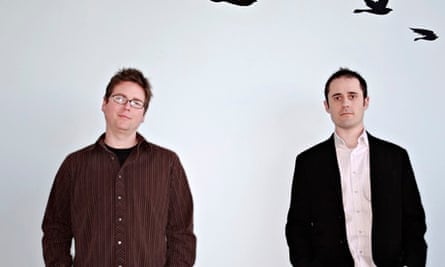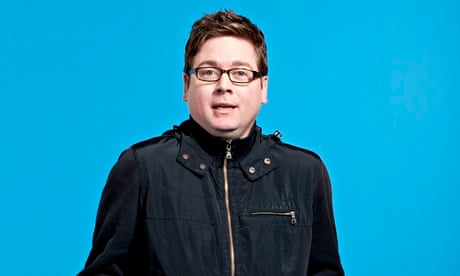Biz Stone was one of four co-founders of Twitter, building, in his words, "a moral compass and righteous soul into the company". The 40-year-old has previously worked at Google and helped to pioneer blogging and podcasting, before being named GQ's "Nerd of the Year" and one of Time's most influential people in the world. He has written a book, Things A Little Bird Told Me, and is now CEO of a new venture, Jelly, a Q&A app that is "a complete reimagining of how we get answers to queries based on a more human approach".
You seem to be quite a caring chap and are the only one of the four co-founders not to have fallen out with the others. Do you prove that nice guys can finish first?
Yeah, sure. "You can be successful and also be nice at the same time" is kind of the gist of my book. You don't lose anything; you gain things. In my case, you gain notoriety, knowledge, friends. I decided one day that I was going to be nice all the time and see if that got me anywhere. And it was fantastic. It made me feel free to go up to teachers and say things like: "I have a no homework policy, here's how it's gonna go."
One reviewer of your book wrote: "I wanted to hate this smug, obscenely-rich vegan do-gooder, but I concluded by thinking success couldn't have happened to a nicer guy." Is that a difficult path to tread?
Most of my Twitter feed is full of people who are saying: "This book is inspirational." And then there are some people who read it as I'm a jerk. What's ridiculous is that, a year and a half ago, I was talking to an executive coach who shook my whole understanding of myself. He said: "Biz, you can't really think that everybody likes you, can you?" And I said: "I've been operating under that assumption for a long time."
What's your favourite compliment or insult that's ever been paid to Twitter?
Early on, when everyone was talking about how useless and trivial it was, somebody wrote: "Twitter is the Seinfeld of the internet. It's a website about nothing." And me, being in my, like, hallucinogenically-optimistic state, thought, well that's great! Seinfeld – that's a hit show!

Edward Snowden: hero or villain?
Is there an in-between? I haven't categorised him yet in my mind. I guess he's more like a vigilante. He broke the law, which in some people's mind would make him a villain. But he also exposed important truths that people should probably know. I was really proud when that Prism stuff came out – there was a New York Times article and it had one little sentence: "Twitter declined to make it easier for the government." I tweeted that sentence.
You're very nice about everyone in the book. The only exception seems to be Mark Zuckerberg. I take it he's not your drinking buddy ...
I respect the guy, we just didn't click. My default if I get nervous is to just joke around and he's so serious. I mean he's all about business. If we got together, he wouldn't laugh at any of my jokes and I probably wouldn't understand what he was talking about – and we would just sort of be uncomfortable for a couple of hours.
You tell a story of your tricky first meeting at Facebook HQ, when Evan [Williams] asked Zuckerberg twice if he wanted the door open or closed. His response both times was "yes", so Evan decided to close it halfway. Did you ever find out which he prefers?

I never did find out what he prefers in his meetings. It was so weird, it was so awkward. "Shall I leave the door open or closed?" "Yes." What is that?
Were you not tempted to include any of the arguments between the four co-founders in the book?
Honestly, I couldn't remember. I wish that Nick Bilton's book [Hatching Twitter] had come out before mine so I could have gotten the specifics. I know that we argued over things. I was never upset – I thought we were engaged in brainstorming. I enjoy those kind of debates. If I were an astrophysicist, I would say that those are the kind of things that planets are born from.
Hatching Twitter is crammed with backstabbing. Are you saying you couldn't remember any of it?
I was oblivious to any of that. My theory is that everyone was trying to do what they thought was best for the company. And some people's ideas were so different they ended up violently interacting. I don't think people have the energy to go out of their way to be like the Count of Monte Cristo and plot revenge for years.
In Bilton's book, Jack Dorsey comes off pretty badly …
I read the first part of the book, where Jack secretly got Noah [Glass] fired – that was a shock to me. I thought Evan fired Noah because he was acting all crazy and stuff. We had Jack saying he couldn't stand it and wanted to be a tailor and I was like, we can't have this. I'm good friends with Jack and he's a sweet person and I couldn't imagine him doing something like that. And if it did happen, I definitely didn't see it. You could chalk it up to my optimism.
Do you have any regrets about the way Noah Glass (the fourth member of the team, who has been called "the forgotten founder") was treated?
Well, I know some things about Noah Glass that other people don't know – in that he's actually very successful. Well, I shouldn't talk about his financial situation, but … we gave Noah a shot and it didn't work out and he was fired. It's California, it's at-will employment. And he was granted a bunch of Twitter stock. That's more than fair. Usually when somebody gets fired, they don't get an extra bonus from the company they never even worked at.
Are you still in touch with him?
Unfortunately not. He moved to France and then quietly moved back to San Francisco and never got in touch. I like him a lot, he was at my wedding. He's a really goofy, fun, gigantic, strong guy – I'd love to go on a hike with him. Maybe he'll read this and call me up.
As something that was supposed to change the world, do you find it slightly depressing that Twitter's most-followed users are Katy Perry and Justin Bieber?
Well, no, because, in order for something to succeed, it needs to be fun and goofy – you need to develop a muscle memory for using it. If you build something that's only serious, people just won't think to use it.
I was struck by the fact that you're vegan and Evan is vegetarian. Should aspiring tech tycoons go veggie?
Ha ha, well, everyone makes their own decisions. I've been vegan for 14 years for compassionate reasons. Evan approaches it logically, he's very pro-health and pro-sustainability. Evan worries a lot about the future of the planet. He doesn't talk a lot, but he wants to make a lasting, positive impact there. But I never want to preach anything.
Your wife, Livia, seems to be the only named woman who appears in your whole book. Do you think the tech world has a gender problem?
There certainly aren't enough women engineers. And that may be because of the cultural bias, starting from kids at school. It is a problem – because we lose that perspective, a more humanitarian approach.
Have you got quite a few senior women in your new company, Jelly?
Erm, right now ... no. We have only two women and they're not in "C-level" [executive] positions, although my company only has 10 people. But there's no women on the board of directors. So yeah, even here, there is an imbalance.
What's your assessment of the British tech scene?
I get a sense that there is a burgeoning startup scene in London … because the silicon part of Silicon Valley has become vestigial. Everything's in the cloud. The chief technology officer of Snapchat has never seen a server – it blew my mind when I read that. You can start a tech company now with an English major and a hired gun engineer.
And do you want to give a quick tweet-size plug for Jelly? Why should we try it out?
Er, no – we're just working away on it, we're changing it every week. The only thing I'd say is that one thing I learned about myself is: helping people makes me happy. So in Jelly I'm trying to build a brand and a platform that allows people to help each other. If I can succeed in doing that, I'll have sort of productised my own personality – which would be great!
If you had to write your epitaph in 140 characters, what would it be?
Here lies @Biz. He tried to be a nice guy.
Things a Little Bird Told Me: Confessions of the Creative Mind is published by Macmillan (£16.99)

Comments (…)
Sign in or create your Guardian account to join the discussion